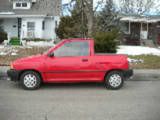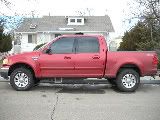Yeah I'm running 10w30 synthetic and it works great in cold weather. Right after it starts it takes a few seconds to run through the passages into the top end and the clatter stops. Would reccomend running synthetic for anyone who needs good cold weather protection. It has been as low as 3 degrees here some mornings.
Announcement
Collapse
No announcement yet.
Valve clatter at startup?
Collapse
X
-
Re: Valve clatter at startup?
I checked the valve train while the cover was off. It is good to go. The clatter stops after oil gets up there.HULi ---------------------------------------------------------------------------> Any-where, any-way, any-time.
"CL4P-TP" - 93 Festiva L
Comment
-
Here's what I do. I drive the car until the engine is good and hot. Then I pull over, leaving the engine running, and put in a can of stp. Then I drive the car for about twenty miles letting stp get good and warn ands coats all the parts. Once the engine stops and all oil and stp drain to pan, the stp stays in the pan but by then the parts have all been coated. When you change the oil, make sure oil is hot, pull plug and most of stp will drain out of pan. Once i put stp in, the lifters don't clatter for about 7-8 months and I live in Colorado where it gets cold. This has worked for me for about 4 years. This summer I'm goin to drop pan and clean pan filter out good and check bottom of pan for metal particles.
Comment
-
On a very cold start up (-15C or colder) ill get some valve chatter as well but it only lasts a short amount of time so I don't get too worried about it
1988 323 Station Wagon - KLG4 swapped
1988 323 GT - B6T Powered
2008 Ford Escape - Rollover Survivor
1990 Festiva - First Ever Completed KLZE swap (SOLD)
If no one from the future stops you from doing it, how bad of a decision can it really be?
Comment
-
I have an 89 that had noisy lifters. I tried the lucas additive which didn't help much. My old man introduces me to liqui moly MOS2 oil additive. After about 200 miles the noise was almost non existent and stayed away for the duration of that oil change. Napa sells the additive in a silver metal can. I think its about 8 dollars or so, you can give it a shot I had good luck with it.'89 L Charcoal
'89 L Red
'91 Ranger
'65 F100
Sepmer Fi
Comment
-
As Damkid said I wouldn't worry about it. As long as you keep your oil changed and run 5-10w30 unless it gets real cold you won't hear it. When it starts clattering on a normal startup as my dad would say it's oil change time. Mine does it every other startup due to the HM oil. The Mobil 1 I ran in the 91 didn't start clattering until 7.5-8k. Used to worry me but hasn't hurt my dad's at 240k. You can run a cleaner but pray the Festiva gods for no new leaks!!91 rusty Festiva 260k
Comment
-
I honestly also think its prob fine as long as its not doing it while driving. All it is, is the hydro lifters dont have oil yet, but it wont hurt them as long as its only a second or so. I would definitely suggest against synthetic if you have over 100,000 miles or so, you may not have a problem... but being you already have some leaks could make them worse or cause new ones. Old gaskets do not like synthetic, but if you want to take the chance synthetic is definitely worth using.
Comment
-
^^^this
The clatter is one or two of the HLAs losing their prime when it sits over night. I have used a few ounces of Seafoam in the oil for a few miles prior to an oil change with good luck. If theres dirt in the HLA it may help, however, if the HLA is worn out theres not much you can do. If nothing else, you can install new HLAs in an hour or two if it gets worse. I would stay away from full Synthetic oils if you have higher miles...unless you like oil leaks and blow-by.
Heres something interesting to try...when you shut the car off at night, bump the ignition just enough so the motor turns a round. Motors with higher mileage tend to stop at close to the same position every time due to wear patterns. Once the ignition is cut, the only thing keeping the motor turning is the flywheel, and friction is what causes the engine to stop turning. Supposedly, It will tend to stop at the position of rotation with the highest friction more times than not. This can cause the same lifters to sit in the same position, holding the same valves open against the spring pressure. Bumping the engine after it stops can alleviate the pressure on the same lifters and keep them from bleeding down over night. I was told this by an old guy that had been building circle track motors since the 1950's. He claimed he could tell where an engine stopped at rest by looking at the wear patterns when he tore it down. I tried it for a while and it seemed to make a difference.....but it may have all been in my head too.....Brian
93L - 5SP, FMS springs, 323 alloys, 1st gen B6, ported head & intake, FMS cam, ported exhaust manifold w/2-1/4" head pipe.
04 Mustang GT, 5SP, CAI, TFS plenum, 70mm TB, catted X, Pypes 304SS cat-back, Hurst Billet+ shifter, SCT/Bama tuned....4.10's & cams coming soon
62 Galaxie 2D sedan project- 428, 3x2V, 4SP, 3.89TLOC
1 wife, 2 kids, 9 dogs, 4 cats......
Not enough time or money for any of them
Comment





Comment